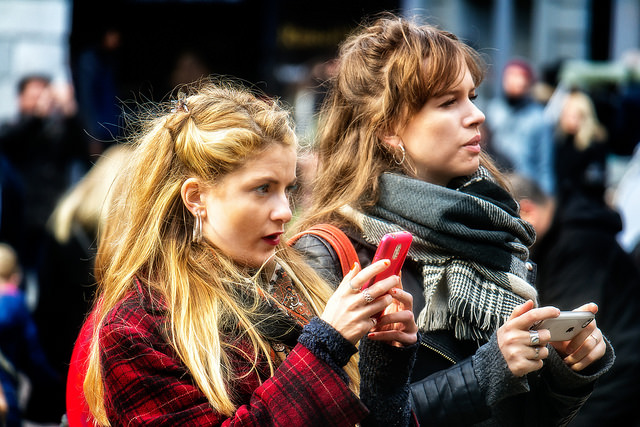
Two billion people use Facebook—that is a mighty scary number in and of itself.
During my apprenticeship with elephant journal, I have learned a lot about Facebook.
For the most part, I don’t like it at all.
Now and again, I’ll let my brain run off the leash of conventional belief and crowd-behavior, so when I think about what Facebook really does with us, I get an instant anxiety attack.
Honestly, Facebook scares the sh*t out of me for multiple reasons:
1. Facebook decides what you get to see.
Yup. How does News Feed decide which stories to show? The stories that show in our News Feed are influenced by our connections and past activity on Facebook. This helps us to see more stories that interest us from the friends we interact with the most.
The number of comments and likes a post receives, and what kind of story it is (photo, video, status update) also make it more likely to appear in our News Feed.
Between all our friends and the pages we have liked, there are many more posts than anyone could ever read in the average duration time we spend online. Instead of leaving it up to fate and timing, Facebook has taken charge and now decides which stories it will show and which ones will be left out.
What the f*ck?
It’s my News Feed, filled with posts from my friends and the pages that I liked. But still, “News Feed decides which stories to show.” Facebook’s explanation is, in fact, a definition of their algorithm. Data about our scrolling, liking, sharing, commenting, and link-clicking all get fed into it. With every click, we mindlessly give a little part of ourselves away. With every click, the algorithm refines our profile and then feeds us more of the same.
They want us to believe they are “making our Facebook experience better,” when, in reality, they just want to put us in well-defined boxes and label us so they can sell us off to their advertisers. By feeding us more of the same (and us mindlessly liking that same stuff over and over again), it’s easier to create and stick to those labels.
In my imagination, Facebook is a giant Cookie Monster that devours everything near and dear to me, regurgitating it as useful little bites to feed a whole flock of greedy advertisers.
Basically, living our lives and talking about it on Facebook is making a small circle of people very rich.
Here are the details on how Facebook manipulates us:
>> By default, our News Feed is set to “top stories,” which (of course) we don’t get to define. Facebook does that for us. Realizing this gives me “Big Brother” shivers. A computer, which can only think in zeroes and ones, determines what are worthy of being the “best moments” in my life. Whoa!
>> Occasionally, it composes unsolicited photo collages or videos of my “highlights,” which I cannot edit. Here’s a scary detail—Facebook will even use photos from our phone that we have never posted before. We live in an age of progress at the cost of our privacy.
>> Not only does the algorithm choose which friends show up in our News Feed (new friends always get priority), it also picks only their most popular posts (warping our perception of our friends’ real lives).
>> Recently, Facebook has started giving videos preference, making pictures and other status updates less visible. (That’s why people have started posting stills with music as a video, in case you’ve wondered.)
>> Posts with links to interesting articles on websites outside of Facebook (like elephant journal) get lowest priority in our News Feed, by default. The higher the “shareability” of a post (uplifting quotes, cute kittens, or Trump-isms) the likelier it is to show in our News Feed. When we like and share these, we (and every person after us) will stay engaged inside Facebook—where they want to keep us.
>> All the pages we have liked will only show up last, by default, after all our friends’ status updates, photos, and videos. It’s those pages (for example, elephant journal’s page) that have the “dangerous” external links that will lure us away from the Almighty Mother Platform. The algorithm barely gives them a chance.
Most of us scroll mindlessly through our News Feed every day, sometimes for hours, making Facebook our main source of information and news. Knowing what I know now of how Facebook manipulates what we get to see, I cannot even imagine the warped reality we are passively co-creating with our likes, shares, and comments in unconscious conjunction with the Facebook algorithm. Blindly accepting what Facebook dishes out to us, we have given away our power to choose how see the world.
This scares the sh*t out of me.
But instead of closing down my Facebook account, since I don’t want to lose connection with all of my foreign friends, I decided to change my Facebook habits. I have tried to find a more mindful way of using the platform, taking back my power to choose what I see. It’s a bit of work, but not impossible.
Here are four ways to be more mindful on Facebook:
1. Set our News Feed to “Most Recent” instead of the default “Top Stories.”
On a computer, we can do this in the menu bar on the left: at the top, right under our name, it says “News Feed.” Click on the three dots behind it, and switch to “Most Recent.” Important note: when we leave our News Feed sitting (even for just a short while) it sneakily switches back to Top Stories mode without notifying us—so make it a habit to check this often!
On a phone, click on the icon with the three horizontal bars at the top right in the menu bar. Somewhere halfway down the appearing menu page, under the header “Feeds,” it gives us the “Most Recent” option.
2. Pick 30 preferred friends and pages we want to see first in our news feed.
On a computer, there is an option to “Edit Preferences” under the same three dots mentioned above. On a phone, even further down on that same menu page under the heading “Help & Settings,” you will find “News Feed Preferences.”
Note: Facebook doesn’t make this option all that desirable, so when you favor a friend or page, you will see every d*mn post they put out. With some pages (or friends), that can be a lot of posts. It’s an all or nothing deal. (The algorithm has taken its hands off and sits back gleefully watching you drown.)
I have found it to be a fun and mindful habit to set a new handful of pages as my favorites every few weeks so I don’t get overfed with too much of the same thing for a long stretch of time.
3. Be more mindful with our clicks.
We can consciously decide if we really want to see a lot more of a person/topic or not. If not, simply don’t “like” or click on what they’re sharing. When a post has a link to an article on another website that we read and enjoyed, by all means hit the “like” button. By liking and sharing those posts, we actually will help our favorite pages (that otherwise sit at the bottom of people’s News Feeds) gain some reach.
4. Pick a friend we haven’t seen in our News Feed for a while and go to their timeline.
Most likely, our friends have been active, but the algorithm singlehandedly decided them unworthy of an appearance in our News Feed because we hadn’t liked any of their recent activity. (Maybe we were just busy, Facebook!) By interacting with them on their timeline, we can resuscitate the friendship. Even better: send this person a private message to truly reconnect. This will also bring them back into your News Feed (take that, algorithm)!
5. Unfollow the people you don’t care to see.
By consciously choosing which friends we want to follow and which we don’t, we filter out a lot of “white noise” from our timeline. It’s another way of taking back our choice over our News Feed—cutting back on mindless media consumption. Unfollowing a friend is not unfriendly—we can still connect with these friends by going to their timeline or sending them a private message. In the meantime, we don’t have to scroll through all the silly pictures of their lunches and lattes.
Even with this mindful approach to reclaiming our News Feeds, Facebook still gives me the shivers the moment I give it some conscious thought.
Look out for Parts 2 and 3 in the Facebook horror-series for other aspects of Facebook that are even scarier.
Relephant Read:
Why I Left Facebook.
Why we Love & Hate Social Media.
~
~
~
Author: Leontien Reedijk
Image: Gary Knight/Flickr
Editor: Danielle Beutell
Copy Editor: Callie Rushton
Social Editor: Travis May

 Share on bsky
Share on bsky




Read 17 comments and reply